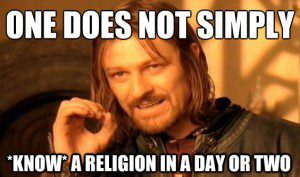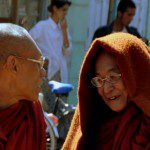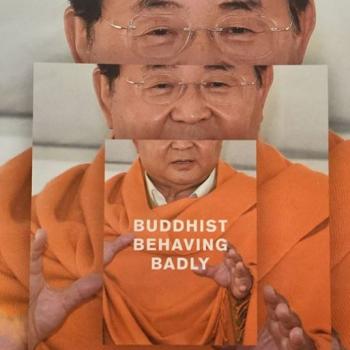For a quick recap: I am taking part in The Fasting Project, created by Dilshad D. Ali of MuslimiaNextDoor and supported by a host of other Muslim Bloggers here at Patheos (I’m paired up with the wonderful Hind Makki who writes at Hindtrospectives). Check out their blogs – and around the Muslim channel – to learn more about Islam, Ramadan, fasting, and more.
This week I undertook my second day of fasting for Ramadan, meaning no food or water from the first light of dawn (in my case 3:28am; yep, England is quite north) until sunset, 9:20pm, so just under 18 hours.
18 hours: no food, no water. Sounds horrible right? Not necessarily. Tuesday night, the day before the fast, my body gave me a strong nudge to have a bit of extra dinner, and I complied quite happily. So I entered the fasting day, Wednesday, a little ‘over-fed’. In the morning (rising at 2:50am) I again had eggs and toast with a banana and an apple (a much larger breakfast than I would typically eat) plus – and this might be helpful for you aspiring and ongoing fasters – an electrolyte tablet with magnesium with about 32oz total morning water. After this breakfast (or, in fact, pre-fast meal – suhoor) I stayed up through the first two salats of the day. At 4:12am, I paused, meditated, and wrote: food digesting; now the first call to prayer.
Reflection: for me it has been about more than just the fast; it has been about learning about what Muslims experience. Two competing, and often very loud, arguments are sometimes made that 1) you can never understand the experience of people of other religions, or 2) since they are biologically human, just like you, most of what they experience isn’t terribly different from what you experience. While I do believe that we can experience something like what others experience, and this is part of our fundamental social, human nature, I did also think of this:
Projects like this are good for introducing us to practices we might not otherwise understand and to people we likely wouldn’t otherwise meet, but this isn’t “Muslim for a Day” or anything like that.
This time, unlike last week, I worked right through 11am and even noon. It wasn’t until 12:30 that I even began to notice that I might like a bit of water or food or coffee(!). But by then I knew that if I just kept on for a few more hours I could take a nap, work a bit more and then be lazy for a while before iftar (the break-fast of the evening, around 9pm). And so on I went until about 4pm when I finally began to lose steam. I made my way to bed and slept blissfully for a bit over two hours before rising for more work.
At 6:41 came the fourth call to prayer.
Sitting at my computer all I could think to reflect on was peace. The peacefulness of my body and in some strange way the world around me as well. The usual commotion ensued around me: birds, people, cars outside my window, my work in front of me, my body patiently waiting for the breaking of the fast. But there was an okay-ness to it all – the way I have felt after a good meditation or perhaps even the second or third day of a long retreat. I smiled. The feeling passed. And I went back to work.
As 9pm and iftar drew near I decided to forego the trip to the Islamic Center and to break fast at home in order to have some extra time with my girlfriend to help her with a project. So my evening ended with one of my (one day famous) green smoothies, a pleasant walk, and the company of the woman I love.
I can’t say I have much more to add, except that fasting does seem to get easier with experience. I think some of my Muslim friends were a bit shocked/worried that I would be taking this on for the first time in the middle of a heatwave in the very long days of England – and rightly so. I’m not a medical doctor, but I would suggest that anyone with any kind of pre-existing health problems, however minor they may seem, should consult one before trying a fast like this for the first time – especially if they are not around friends/family who have fasted.
Second, the practice itself seems to be fairly powerful. Whether you are doing it as a Muslim or not, a long day of fasting can force you out of routines, out of ambivalence, out of basically blindly marching toward death. It is also anti-consumerist in both the obvious sense and a deeper way as your mind is necessarily drawn away from grasping to *things* out in the world and more toward the strange condition of your body on no food or water. This breaking from consumerism, and the egocentric nature of so much of our lives does, I think, give rise to feelings of peace and well-being. So whether you are a practicing Muslim or not, I would encourage you to explore these and similar practices that are both difficult and perhaps seemingly pointless, but in the end turn out to be very rewarding and life affirming.
Lastly, I would hope that this experience of mine (and hopefully others) would reinforce the truth that we are all one / interconnected in this world. As distant and strange and ‘other’ as any people or religion might seem, there are always going to be bridges that can carry us into one-another’s faiths even if only partially and temporarily. Go out there, learn from your neighbors of different faiths and teach them yours. Just one simple act of kindness might reverberate instantly, or it might take years or decades, but its effects are no less powerful.













